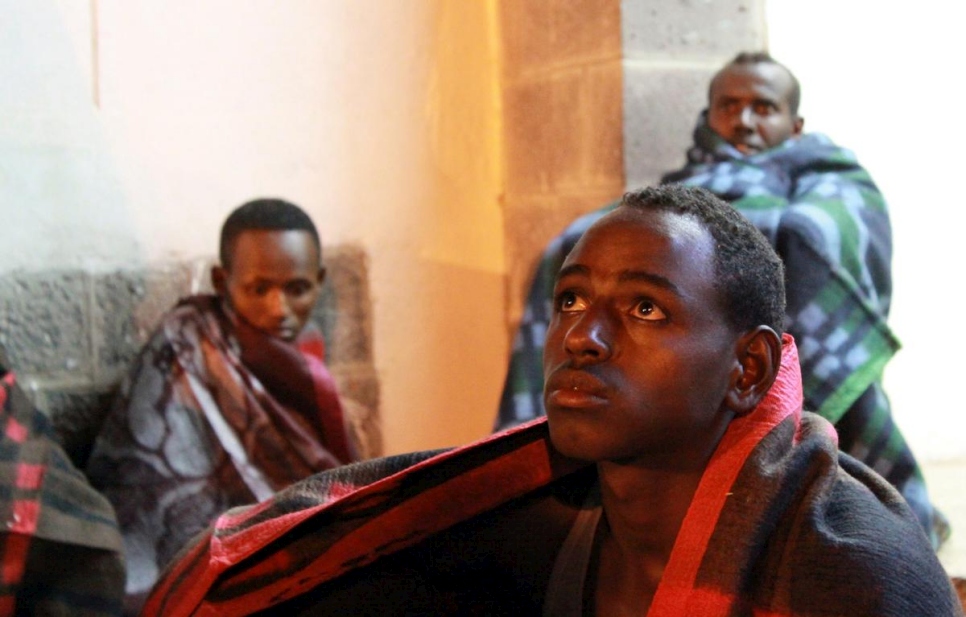Fleeing Horn of Africa, new arrivals find more peril in Yemen
On arrival in war-torn country, refugees and migrants are routinely subjected to detention and abuse as UNHCR calls for unhindered access to detainees.

New arrivals rescued after the capsizing of a smuggling boat in the port of Aden in March 2009. © UNHCR/Rocco Nuri
ADEN, Yemen – In excruciating pain from weeks of beatings and now suffering from gangrene and facing a leg amputation, 30-year-old Ethiopian refugee Jon* never imagined his quest for safety would result in such a horrific ordeal.
“I landed in Yemen about a month ago. I was dragged by armed men who held me captive for over a month. They beat me so badly that I lost track of what was happening,” he recounted while awaiting surgery.
Yemen is historically a country of migration, refuge and transit for people fleeing the Horn of Africa. But more than three years of conflict have plunged the country into the world’s deepest humanitarian crisis, and Jon is one of many to have crossed the Gulf of Aden in search of safety only to meet new dangers on arrival.
Last year, according to humanitarian partner data, more than 87,000 new arrivals, including refugees and migrants, crossed from the Horn of Africa to Yemen.
"They beat me so badly that I lost track of what was happening.”
UNHCR, the UN Refugee Agency, on Tuesday warned that worsening conditions in Yemen as a result of unabated conflict, deteriorating economic conditions and increasing criminality are exposing them to harm and exploitation.
“With prolonged conflict and insecurity threatening state institutions and weakening the rule of law, there are growing accounts of extortion, trafficking and deportation,” UNHCR spokesman William Spindler told journalists at a news briefing in Geneva.
Spindler said refugees and migrants reaching Yemeni shores are routinely arrested, detained, abused, or extorted, and in some cases forcibly returned by the same smugglers who brought them to the country.
Since February this year, UNHCR has been following up on the situation of at least 100 new arrivals to Yemen who have been arrested and held inside detention facilities. There have been numerous reports of abuse, with some new arrivals subjected to physical and sexual violence as well as psychological harassment.
Survivors have provided UNHCR with accounts of being shot at, suffering regular beatings, rapes of adults and children, humiliation including being forcibly stripped, made to witness summary executions, as well as denial of food.
“They whipped us on our backs and our hands,” said Sam,* an asylum seeker from the Horn of Africa who arrived in Yemen more than a year ago and was held in various detention facilities across the country. “Some nights I wouldn’t even be able to sleep because my back would be ripped and swollen from all the beatings and I would be left in agonising pain.”
Held indefinitely without due process, many are now languishing in overcrowded and unsanitary detention facilities where in addition to abuse, they are threatened with the prospect of deportation to the countries from which they fled persecution or conflict.
Attempts by UNHCR to engage in advocacy on these issues have been regularly frustrated, given the complex structures of responsibility and accountability as a result of the ongoing conflict across the country.
UNHCR is appealing to all state and non-state actors that are effectively controlling detention facilities where new arrivals are being held, to ensure those being detained are treated humanely and with dignity in accordance with refugee and human rights law. It is also demanding unfettered access to detainees in order to assist those seeking international protection.
“I left my country in pursuit of freedom, but when I came to Yemen I was arrested and detained."
UNHCR has been supporting authorities in Yemen to receive, register and document refugees and asylum seekers and is seeking to increase support to the Immigration, Passport and Naturalization Authority to further improve reception arrangements for new arrivals.
With the prevailing conflict and insecurity in Yemen offering little prospect of protection, UNHCR has long been warning of the risks of crossing to the war-stricken country. In February last year, it launched a regional awareness campaign entitled Dangerous Crossings designed to spread awareness among those contemplating the perilous journey to Yemen from the Horn of Africa.
For asylum seeker Sam,* the travesty of fleeing his home country in search of liberty only to be stripped of it in his place of refuge is not lost on him.
“I left my country in pursuit of freedom, but when I came to Yemen I was arrested and detained and freedom was taken from me.”
*Names changed for protection purposes
